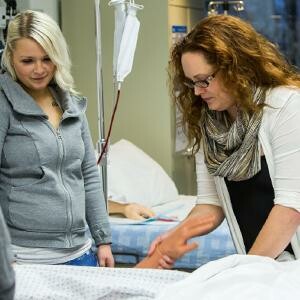Dual Credit Health Care Aide: The Local, Homegrown Workforce we Need
Posted on Apr 17, 2019
The most popular Dual Credit program at Northern Lakes College sees students completing a Health Care Aide Certificate before leaving high school and then going directly into the workforce or further health training upon high school graduation. Dual Credit programming opens the door for high school students to access post-secondary programming while still in high school, gaining both high school and post-secondary credit.
Northern Lakes College has offered Health Care Aide through Dual Credit since 2011-2012. Of the 85 Dual Credit Health Care Aide (HCA) graduates since then, a good percentage are from the tri-partnership agreement between Alberta Health Services (AHS), Fort Vermilion School Division, and Northern Lakes College (NLC). Says Kathy Reid-Soucy, Dean, Health Programs at Northern Lakes College, “The partnership is in its third year, with a third cohort of high school students taking the HCA program. Northern Lakes College is proud to be part of a collaboration that ensures local, qualified staff for regional care centres.”
Fort Vermilion School Division supports and promotes Dual Credit programs that provide students with training and skills that will help them transition into the workforce. “The HCA program fits perfectly with that philosophy because there is a definite need for Health Care Aides in our region,” states Karen Smith, Supervisor of Learning Services with Fort Vermilion School Division.
Fort Vermilion School Division is in its third year of offering the NLC Dual Credit Health Care Aide program through the tri-partnership. In year one, 11 students completed the program and in year two, nine students completed. There are currently 12 students enrolled. Students from high schools in Fort Vermilion, High Level, La Crete, and Rocky Lane have completed the program. “Having the support of Alberta Health Services has been crucial in the success of this program. AHS has provided our students with clinical skills instruction, practicum placements, plus hiring information and support,” comments Smith.
Angie Mann, Director of Clinical Operations Area 1 for Alberta Health Services is equally enthusiastic about the success of the partnership. “We need to sustain our local health services. This is an innovative way to ‘grow our own’.” Mann goes on to explain that AHS is always facing staffing challenges in the north. Recruitment of professionals from the south or out of province is a temporary, but unsustainable, solution as they do not have a connection to the communities and often leave. “We need to build capacity locally with people who grow up in and know the north.” She goes on to explain, “Because we recruit these students in their hometowns, they are ‘culturally competent’; they can work with clients in long term care and there is no cultural gap or language barrier. For some, HCA opens the door; it is the beginning of a career in health. Some decide they want to pursue nursing once they achieve the certification. This is the local, homegrown workforce that we need.”
AHS representatives meet with HCA Dual Credit students and provide an overview of all the job opportunities. They review the documents needed to apply for employment with AHS. The managers from the northern AHS sites come in to meet the students. AHS supports their practical hours, so many graduates have already worked in the long-term care, acute care, and emergency facilities of the local health centres. The students are familiar with the organization and its facilities upon graduation, so it is a seamless transition into the workplace. Some of the students who have achieved their certification are still in grade 10 or 11, so are able to work on weekends and over the summer.
Concludes Mann, “Other communities ask us how this works. It is based on excellent relationships with both internal and external stakeholders. Relationships create opportunities.”
The Dual Credit HCA program at Northern Lakes College currently has 30 students from six school divisions participating in the program, including Aspen View Public Schools, Fort Vermilion School Division, High Prairie School Division, Holy Family Catholic Regional Division, Peace River School Division, and Peace Wapiti Public School Division. Since it was first offered as Dual Credit in 2011-2012, the program has achieved an 87% completion rate with 85 high school students obtaining their HCA Certificate. Four Dual Credit HCA students went on to become an Emergency Medical Responder, Primary Care Paramedic, Practical Nurse, and Oilfield Operator. Five completers are currently enrolled in the College’s Practical Nurse program.